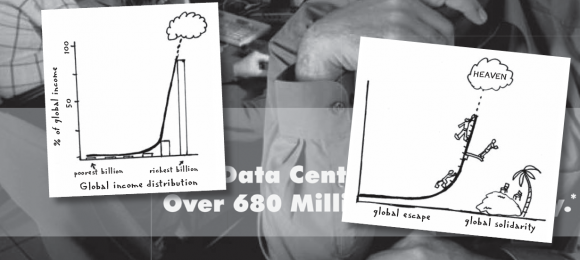Brief thoughts on my post-Christian hope

Image from Geez issue 2
Now that I’m no longer motivated the lure of bliss in the afterlife, I’ve had to identify new avenues of hope.
This world matters.
The hyper-apocalypticism of my conservative Christian youth, has faded. I can’t wait to taste heaven. Moreover, I need a vision that’s this-worldly because I want to live in this world.
I’ve tasted full life here.
It’s in life-long companionship, eating simple meals, in witnessing the vindication of an underdog’s stalwart exposure of the abuse of power (this could be the Bolivia water wars or a tulip poking through the muck), in a poetic turn of phrase, an in the strum of a guitar. I want more. I am more. Unfortunately for Wal-Mart and the retail economy, I want to be the more that I am.
We’ve messed up the world.
Our social fabric is stretched by inequity. I feel the non-human animal, plant and water world being tortured. I agree with Derrick Jensen’s assessment in Endgame. The words, “We are f**cked,” seem irrefutable.
I must attend to the ills around me.
The ills include include the concentration of wealth, environmental destruction by corporations and consumer lifestyles, commodity fetishism, and our patterns of identity creation which make Others separate and inferior (i.e., racism, sexism, homophobia, ableism, sizeism, etcetera-ism). The privileges given to me by virtue of birth carry a responsibility to undermine the priviliges that birth afford.
Hope is found in confronting despair.
This is a fortunate paradox: I name an evil and it has less power, it becomes finite and assailable. Walter Brueggeman in The Prophetic Imagination says the same thing when he affirms the prophet’s lament and the hope it brings to a people who languish under the regimes of others (see a little reference to his book here,). While I disagree with Derrick Jensen’s conviction that violence can be overcome with counter-violence, I do expect that noncooperation with violence will be perceived as violence by those in power. (Toronto’s chief of police had this perception when he condoned the arrest of peaceful demonstrators at the G20 summit in June 2010. He said they were complicit with the window smashing, whether they agreed or not.)
An avenue of hope leads to a community of resistance.
People who grow their own food — in their back yards or as community shared agriculture projects — embody a world where reliance on genetically modified, commercially produced food from afar is minimized. People who carry tools to their construction jobs with a bicycle trailer embody hope. They recognize and name the gigantic problem of car culture (fossil fuel depletion; sedentary, financially-burdened, disoconnected drivers; urban design that alienates humans, animals and plants, etc.) and take small steps in a hopeful direction.
Post-Christian faith.
How does this relate to my Christian faith? Sometimes I think I have post-Christian faith because it is so different from the faith of my youth, a conservative evangelical Mennonite from an insular immigrant community in Vancouver.
I see Jesus as a social agitator and agent of hope.
In the face of oppressive Roman occupation, peasant vulnerability to tax skimming, partriarchy, slavery, exclusive religious codes, he moved to the margins and dwelt among those who suffered. (Ched Myers has helped me with this, especially with his Binding the Strong Man. See also Sallie McFague’s Life Abundant (find some quotes here and Sylvia Keesmaat and Brian Walsh’s Colossians Remixed.) His spiritual insight allowed him to suffer with meaningfulness and purpose. I want to be increasingly open to this path. May it bring love, faith and hope. — Aiden Enns, editor, Geez magazine


Sorry, comments are closed.